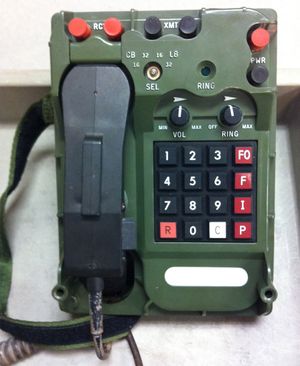Difference between revisions of "DNVT"
| Line 1: | Line 1: | ||
| − | [[File:TA-1042A-Top.jpg|thumb|alt=TA-1042A/U DNVT|TA-1042A/U DNVT]] The Digital Nonsecure Voice Terminal (DNVT) is a telephone set which transmits and receives conditioned diphase modulated data at a signaling rate of 16 or 32 kilobits per second (kbps) over a 4-wire interface.<ref>FM 3-04.120 ¶2-83.</ref> It is available in either desk set or field telephone models<ref>Kirsch 1981, p. 1609.</ref> Field models include: | + | [[File:TA-1042A-Top.jpg|thumb|alt=TA-1042A/U DNVT|TA-1042A/U DNVT]] The Digital Nonsecure Voice Terminal (DNVT) is a telephone set which transmits and receives conditioned diphase modulated data at a signaling rate of 16 or 32 kilobits per second (kbps) over a 4-wire interface.<ref>FM 3-04.120 ¶2-83.</ref> It is available in either desk set or field telephone models<ref name="Kirsch1609">Kirsch 1981, p. 1609.</ref> Field models include: |
* [[TA-954/TT]] | * [[TA-954/TT]] | ||
| Line 6: | Line 6: | ||
| − | Pairs of [[TA-1042A/U]] DNVTs may be used in local battery (LB) mode as simple field phones, without requiring connection to a telephone exchange. The [[TA-954/TT]], however, must always be connected to a telephone exchange as it does not support direct DNVT-to-DNVT connection. When connected to a telephone exchange and configured in common battery (CB) mode, the DNVT receives phantom power from the telephone exchange over the send/receive line pairs. <ref> | + | Pairs of [[TA-1042A/U]] DNVTs may be used in local battery (LB) mode as simple field phones, without requiring connection to a telephone exchange. The [[TA-954/TT]], however, must always be connected to a telephone exchange as it does not support direct DNVT-to-DNVT connection. When the [[TA-1042A/U]] is operated in local battery mode, a power source of 24-56 VDC must be connected to the PWR binding posts on the right side of the phone, with positive voltage connected to the red post. |
| + | |||
| + | When connected to a telephone exchange and configured in common battery (CB) mode, the DNVT receives 24-56 VDC phantom power from the telephone exchange over the send/receive line pairs.<ref name="Kirsch1609" /> Positive voltage is applied to either or both of the red RCV terminals, and negative voltage is applied to either or both of the black XMT terminals. | ||
| + | |||
| + | ''(TBD: Can the [[TA-1035/U]] be operated without connection to an exchange? Can either the [[TA-954/TT]] or [[TA-1035/U]] be powered in LB mode?)'' | ||
| Line 19: | Line 23: | ||
| − | The DNVT has the following specifications:<ref>FM 3-04.120 ¶2-86 | + | The DNVT has the following specifications:<ref name="Kirsch1609" /><ref>FM 3-04.120 ¶2-86.</ref> |
* Data rates of 16 or 32 kbps synchronous or up to 2400 bits per second asynchronous. ''(TBD: Does this only apply to the [[TA-1042A/U]]?)'' | * Data rates of 16 or 32 kbps synchronous or up to 2400 bits per second asynchronous. ''(TBD: Does this only apply to the [[TA-1042A/U]]?)'' | ||
Revision as of 16:40, 2 June 2013
The Digital Nonsecure Voice Terminal (DNVT) is a telephone set which transmits and receives conditioned diphase modulated data at a signaling rate of 16 or 32 kilobits per second (kbps) over a 4-wire interface.[1] It is available in either desk set or field telephone models[2] Field models include:
- TA-954/TT
- TA-1035/U
- TA-1042A/U (with data connector for AN/UXC-7 tactical facsimile machine, AN/UGC-144 communications terminal, etc.)[3]
Pairs of TA-1042A/U DNVTs may be used in local battery (LB) mode as simple field phones, without requiring connection to a telephone exchange. The TA-954/TT, however, must always be connected to a telephone exchange as it does not support direct DNVT-to-DNVT connection. When the TA-1042A/U is operated in local battery mode, a power source of 24-56 VDC must be connected to the PWR binding posts on the right side of the phone, with positive voltage connected to the red post.
When connected to a telephone exchange and configured in common battery (CB) mode, the DNVT receives 24-56 VDC phantom power from the telephone exchange over the send/receive line pairs.[2] Positive voltage is applied to either or both of the red RCV terminals, and negative voltage is applied to either or both of the black XMT terminals.
(TBD: Can the TA-1035/U be operated without connection to an exchange? Can either the TA-954/TT or TA-1035/U be powered in LB mode?)
The DNVT offers the following features:[4]
- Digital telephone/data set for mobile subscriber equipment (MSE) and TRI-TAC systems.
- Full duplex voice or data communications.
- Push-to-talk (PTT) for combat radio net interface.
- Standard four-wire loop interface.
- Mean time between failures (MTBF): 150,000 hours.
- Automatic tracking of 16 or 32 kbps switch loop rate via autobaud feature.
The DNVT has the following specifications:[2][5]
- Data rates of 16 or 32 kbps synchronous or up to 2400 bits per second asynchronous. (TBD: Does this only apply to the TA-1042A/U?)
- Loop interface: four-wire line, up to 4km of WF-16/U field wire.
- Line impedance: 125Ω ±10% resistive.
- Operating voltage: 24 to 56 volts DC.
- Audio codec: continuously variable slope delta modulation.
- Signal format: Conditioned diphase at 16 or 32 kbps.
- Codeword format: Cyclically permuted 8-bit words.
- Output level: 3V peak to peak.
- Input level: between 150 mV and 4V peak to peak.
Related Files
![]() TTC-39 TRI-TAC family brochure from GTE Sylvania
TTC-39 TRI-TAC family brochure from GTE Sylvania
Notes
